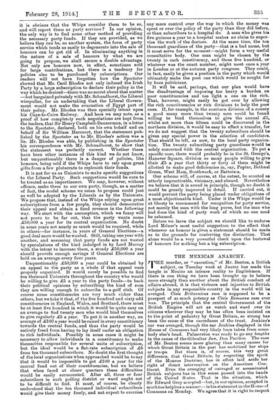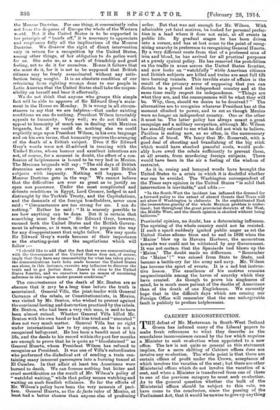THE MEXICAN ANARCHY.
THE murder, or " execution," of Mr. Benton, a British subject, on Tuesday week at Juarez has made the tangle in Mexico an intense reality to Englishmen. If there is one thing we have been brought up to believe more strongly than another about the British conduct of affairs abroad, it is that violence and injustice to British subjects in any responsible country in the world will be avenged. Civic Britannicul sum is supposed to be a passport of as much potency as Civic Romantic sum ever was. The principle that the central Government of the British Empire will act as watch and ward over its citizens wherever they may be has often been insisted on to the point of pedantry by Great Britain, so strong has been the sense of the sacredness of the trust. Jenkins's ear was avenged, though the ear Jenkins displayed in the House of Commons had very likely been taken from some- body else's head. Palmerston was ready to go any lengths in the cause of the Gibraltar Jew, Don Pacifico. The case of Mr. Benton seems more glaring than many causes for
which Great Britain in the past has mobilized her slims or troops. But there ia, of course, this very great difference, that Great Britain, by respecting the spirit of the Monroe Doctrine, has in effect laid aside her right of direct intervention on the American Con- tinent. Even the avenging of outraged or assassinated British subjects has in this sense passed into the hands of the United States. That is the situation, which
Sir Edward Grey accepted—but, in our opinion, accepted in much too helpless a manner—in his st ateuieut in the House of Commons on Monday. We agree that it is right to respect the Monroe Doctrine. For one thing, it conveniently rules out from the disputes of Europe the whole of the Western w: rid. But if the United States is to be supported in her principle of " hands off," it is necessary to appreciate and emphasize fully all the implications of the Monroe Doctrine. We disavow the right of direct intervention only in return for a recognition by the United States, among other things, of her obligation to do police work for us. She asks us, as a mark of friendship and good feeling, not to do it for ourselves. Hence it follows that she must do it, for it is not to be supposed that British citizens may be freely assassinated without any satis- faction being sought. It is an absolute condition of our refraining from righting wrongs done to our people in Latin America that the United States shall take the respon- sibility on herself and bear it effectually.
We do not think that anyone who grasps this simple fact will be able to approve of Sir Edward Grey's state- ment in the House on Monday. It is wrong in all circum- stances to say that we are helpless—that under existing renditions we can do nothing. President Wilson invariably appeals to humanity. Very well; we do not think an appeal to humanity of much use in dealing with Mexican brigands, but if we could do nothing else we could explicitly urge upon President Wilson, in his own language and on his own terms, that humanity requires the avenging of the death of a British subject. Even if Sir Edward Grey's words were not ill-advised in treating with the United States, whose honour and excellent intentions are not, of course, for a moment in doubt, the effect of a con- fession of helplessness is bound to be very bad in Mexico. The Mexican brigands will say : "The old days of British draconian severity are over. We can now kill British subjects with impunity. Nothing will happen. The Monroe Doctrine gets in the way." We cannot believe that the difficulties are ever so great as to justify an open non possums. Under the most complicated and delicate- conditions in Egypt, Lord Cromer, hedged in and distraught by the Turkish Treaty, and the Capitulations, and the demands of the foreign bondholders, never once said : " Circumstances are too strong for me. I can do nothing." Rather he said : " It is scarcely possible to see bow anything can be done. But it is certain that something must be done." Sir Edward Grey, however, excused both the United States and the British Govern- ment in advance, as it were, in order to prepare the way for any disappointment that might follow. We may quote Sir Edward Grey's words because of their importance as the starting-point of the negotiations which will follow :-
"I should like to add that the fact that we are communicating with the Government of the United States does not, of course, imply that they have any responsibility for what has taken place ; the communications have been made because the United States can alone, in this instance, exercise any influence to discover the truth and to get justice done. Juares is close to the United States frontier, and we ourselves have no means of exercising mamma in this region under present conditions," The circumstances of the death of Mr. Benton are so obscure that it msy be a long time before the truth is ascertained. General Villa, the joint-leader with General Carranza of the rebels, or Constitutionalists, in Mexico, was visited by Mr. Benton, who wished to protest against the continual looting and destruction practised by the rebels. Mr. Benton, who had been a very rich man, is said to have been almost ruined. Whether General Villa killed Mr. Benton with his own hand or had him tried and " eiecuted" does not very much matter. General Villa has no right under international law to try anyone, as he is not a recognized belligerent. He has been a bandit most of his life, and the deeds to his record within the past few months are enough to prove that he is quite as "bloodstained" as General Huerta, whom President Wilson has refused to recognize as President. It was one of Villa's subordinates who performed the diabolical act of sending a train con- taining many innocent passengers into a burning tunnel at El Cumbre. In that affair at least ten Americans were burned to death. We can foresee nothing but bitter and cruel mortification as the result of Mr. Wilson's policy of "watchful waiting," while that policy means watching and waiting on such fiendish villainies. So far the effects of Mr. Wilson's policy have been the very nemesis of paci- fism. General Huerta, as the de facto ruler of Mexico, at least had a better chance than anyone else of producing order. but that was not enough for Mr. Wilson. With admirable yet fatal motives, he looked for personal perfec- tion in a land where it does not exist, at all events in public life. By gradual stages he has been driven into a corner, and has at last come to the point of recog- nizing anarchy in preference to recognizing General Huerta. By a very different route from that of a professed man of iron and blood, he has arrived for all practical purposes at a purely cynical policy. He has removed the prohibition on the traffic in arms across the United States frontier, and now looks on " watchfully " while American citizens and British subjects are killed and trains are sent full tilt into burning tunnels. This terrible state of affairs is the result of the primary error of supposing that you can dictate to a proud and independent country and at the same time really respect its independence. "Things are what they are, and the consequences will be what they will be. Why, then, should we desire to be deceived?" The alternatives are to recognize whatever President has at the moment climbed to power, and to act as though Mexico were no longer an independent country. One or the other it must be. The latter policy has always meant a great campaign and a military occupation, although. Mr. Wilson has steadily refused to see what he did not wish to believe. Pacifism is ending now, as so often, in the unnecessary effusion of blood. We fancy that Mr. Roosevelt, with a good deal of shouting and brandishing of the big stick which would have shocked peaceful souls, would prob- ably have awed the rebels sufficiently to prevent them, at all events, from murdering foreign subjects. There would have been in the air a feeling of the wisdom of restraint.
As it is, cooing and honeyed words have brought the United States to a crisis in which it is doubtful whether war can be avoided. The Washington correspondent of the Times says opinion in the United States "is solid that intervention is inevitable," and adds "In the South-West the incident has inflamed the demand for a forward policy to the extent of absurd threats that Texas will act alone if Washington is obdurate. In the sophisticated East the tremendous gravity of the whole Mexican problem is tinder-. lined ; but throughout the great provincial districts of the West, the Middle West, and the South opinion is shocked without being bellicose."
Provincial opinion, no doubt, has a determining influence. The uprising of the whole country could not be resisted. If such a spark suddenly ignited public anger as set the United States aflame from end to end in 1898 when the Maine' blew up in Havana Harbour, the momentum towards war could not be withstood by any Government. It was not certain that the Spaniards had blown up the Maine.' The doubt made no difference.. "Remember the ' Maine' !" was echoed from State to State, and became a battle-cry for the army and navy. Mr. Wilson has become the sport of events. It is a sad but instruc-, tire lesson. The excellence of his motives remains unquestionable among the havoc of anarchy which they have created. As though to prove his singleness of mind, he is much more patient of the deaths of Americans than of the death of one Englishman. We earnestly hope that in the difficult days which are coming our Foreign Office will remember that the one unforgivable fault is publicly to profess helplessness.















































 Previous page
Previous page